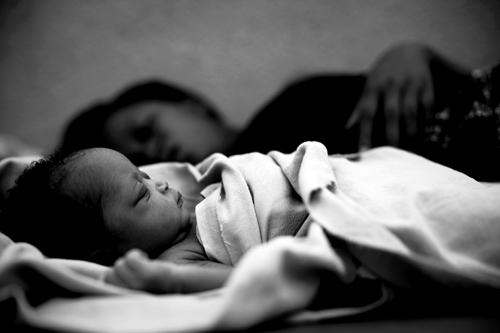
Men and women from around Africa, wearing traditional dress and identical lanyards, roamed the halls of a lavish hotel in Senegal's capital city Dakar last week, talking about the importance of widespread condom use, or rather, their disappointment in the lack thereof. At the International Conference on Family Planning, the British government announced its plan to buy millions of female condoms for African women, and non-profits handed out pamphlets that illustrated how using condoms would change the continent in a number of ways, including planning family size and stopping the spread of H.I.V.
Condoms, contraception, and H.I.V. are the subject of a recent study that had many at the conference worried. In October, researchers from the University of Washington published a paper concluding that taking the most popular hormonal contraception for women in eastern and southern Africa—a hormone shot injected every three months—effectively doubles the risk of women becoming H.I.V.-positive. (Michael Specter wrote at the time that African women faced a bleak dilemma between preventing pregnancy or avoiding H.I.V.) Within days of local newspapers running the findings, the Ugandan and Kenyan health ministries released statements cautioning against the "fear, alarm, and panic" in their countries, and advised women to continue using both hormonal contraception and condoms to ward off unwanted pregnancies and disease. The statements added, somewhat optimistically, that the study was the latest in a series of inconclusive reports on the relationship between hormonal contraception and H.I.V. (which is true; it is the latest in seventeen studies that have been conducted over twenty-five years on the issue, with varying results), and that the study shouldn't arouse confusion, at least not yet (which is probably false). And, indeed, there are still questions to be answered about the study.
In Dakar, the study was the talk of the conference, which I attended with support from the Pulitzer Center on Crisis Reporting. I spoke with Willard Cates, president of research for a reproductive health non-profit called FHI 360, who reviewed the newest study when its authors submitted it for publication in the Journal of the American Medical Association. Cates had recommended the study for publication, but with several reservations. The study had intended to answer a different question—whether herpes treatment makes women more or less susceptible to H.I.V.—and followed nearly four thousand couples in Botswana, Kenya, Rwanda, South Africa, Tanzania, Uganda, and Zambia for almost two years. Women were asked multiple questions about their behavior in the previous month, including what type of contraception they used.
Women said that they used either hormonal or non-hormonal contraception (such as condoms and spermicide) and both groups reported similar rates of condom use. If the women in the group who were taking hormone shots were not using condoms to the extent that they said they were, however, it could have affected the results. Their responses may have been the result of social desirability bias—an aspect of human nature where people who are frequently counseled to take a certain action, like using condoms or brushing their teeth every night, may say they do so when asked, even if they don't. There also could have been multiple differences in the behavior of the women in the two groups, such as how they select partners or if they have frequent sex.
And there is no satisfying consensus about the mechanism by which the contraceptive encourages infection. At the moment, one theory suggests that the spike of hormone injected into a woman's body in the first month after she gets a hormone shot may trigger an immune or anatomic reaction that allows her to become more susceptible to H.I.V.
The researchers I talked to in Dakar raised the possibility of a randomized control study, where women are followed after they are separated into groups that alternatively are given hormonal contraception, IUDs, and implants, the latter two being methods that are not suspected to have links to H.I.V. The complication is that there would be doubts about assigning women to a regimen that a major study has now suggested is dangerous.
There is also the matter of the study's finding that, when H.I.V.-positive women take the shot, their male sexual partners are twice as likely to become infected than if they had used no contraception. That conclusion is sobering. The reach of H.I.V. in Africa goes without saying. What needs to be determined, and soon, is whether using the once-ideal package of hormonal contraception and condoms is backfiring.






